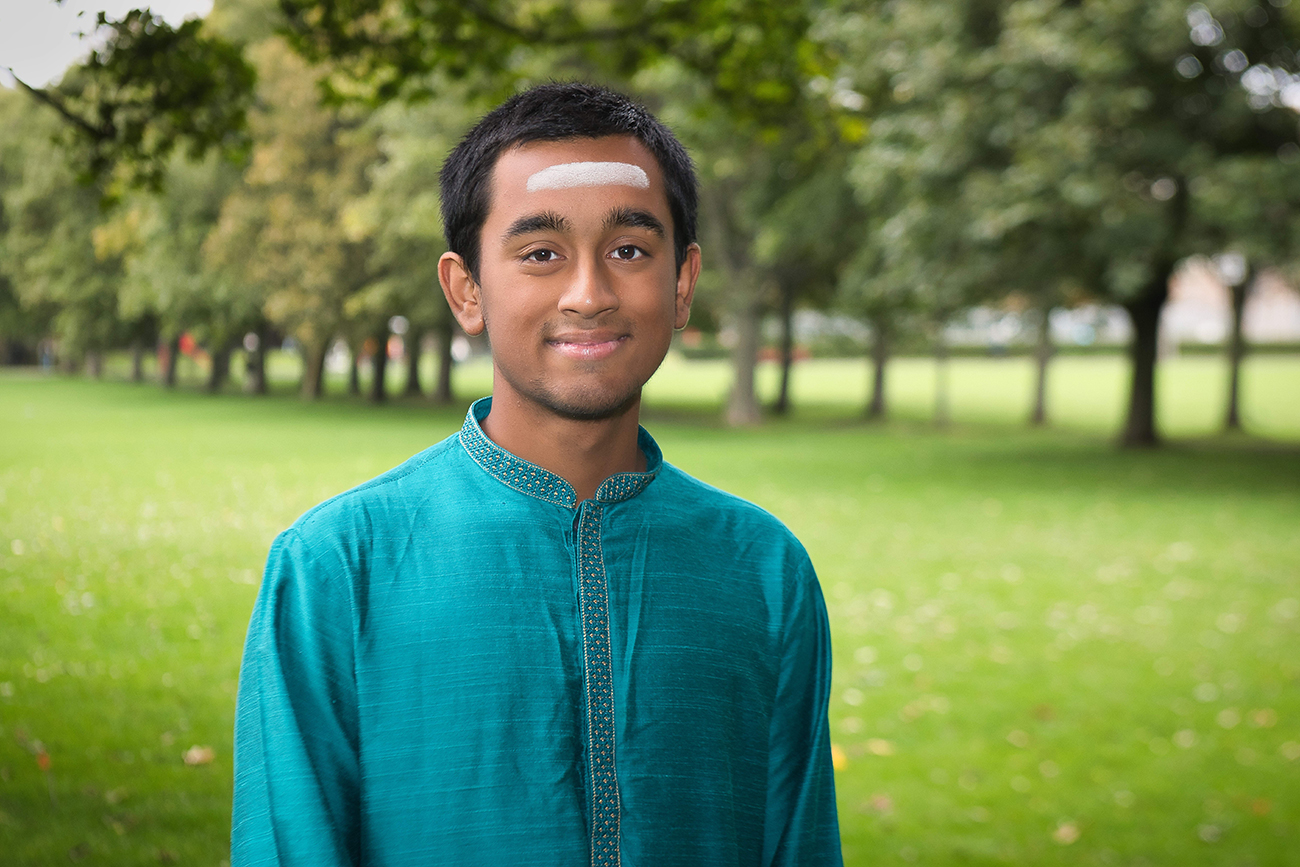Faces of Faith
Over five million people live in Scotland and we each have a story to tell.
This exhibition is a showcase of Scotland’s diverse religious and cultural communities.
Freedom of religion and belief is a key part of Scottish society, but few are aware of just how many beliefs are practised here, or of the diversity within each community.
Through the stories of sixteen people, we explore the joys, challenges, and complexities of living as a person of faith in Scotland, and the impact these communities have on a local, national, and international level.
The common thread weaving through each story became clear to us with every interview. Our many religious communities may be diverse in culture and practice, but our values are intertwined – we all hope for, and are working towards, a better future for Scotland and the world.
We spent the summer getting to know each of these sixteen people and this exhibition is the culmination of many moments of connection.
In these photographs, we hope you will see not photos of strangers, but of the friends we came to know.
Thank you to the sixteen people who generously shared their stories and time with us.
This is an exhibition funded by Interfaith Scotland for Scottish Interfaith Week.
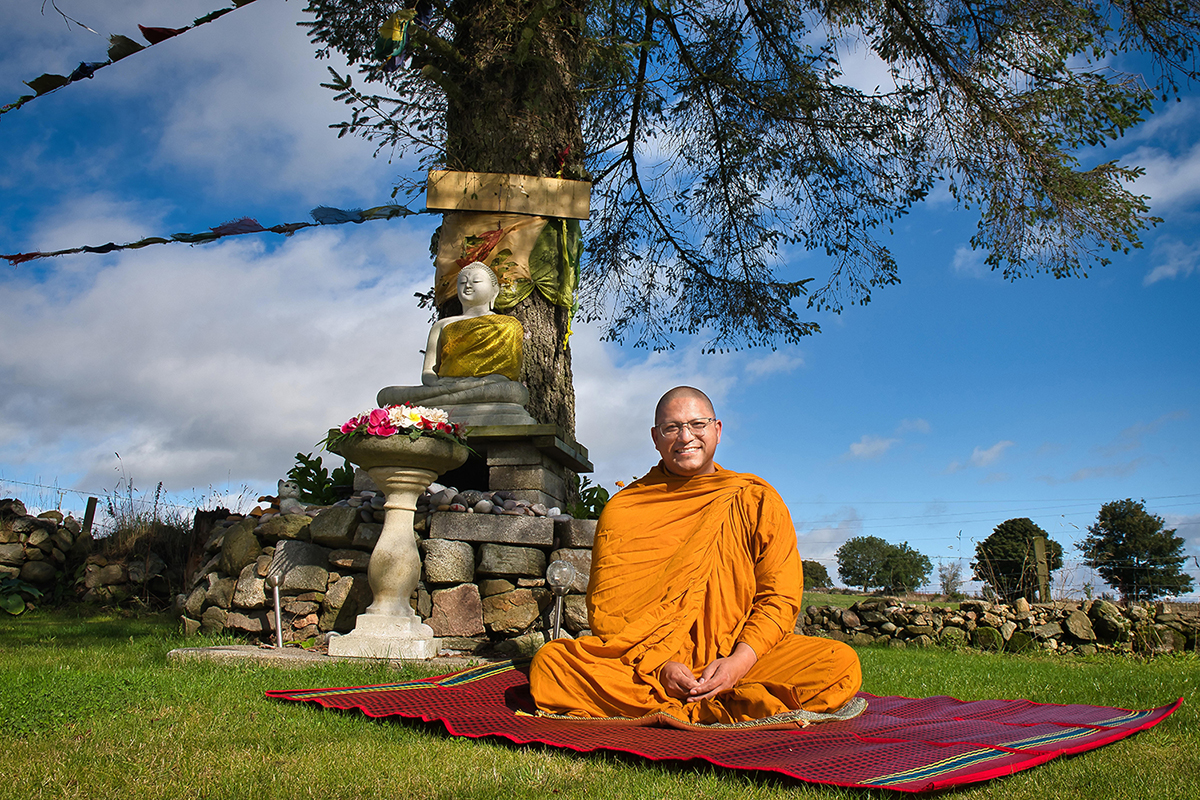
Sujan
Nepalese Buddhist, Monk, Acting Abbot, Chaplain, Ajahn (teacher)
The weather was not the coldest part of Sujan’s arrival to Aberdeen in 2011. Originally from a Hindu family in Nepal, Sujan spent eight years training to be a Theravada Buddhist monk in Thailand before he was seconded to the UK. But he did not receive the warmest welcome here.
Sujan is proud of the orange robes, known as Kāṣāya, that he wears to represent his faith and beliefs. He stands out in any crowd, but particularly among the subdued grey raincoats of Aberdeen’s locals. While exploring the city he received many comments on his appearance, some kind and curious, and others less so.
Quickly Sujan decided on how best to address the public’s curiosity and commentary on his presence. He resolved to make himself as visible as possible. Those who live in Aberdeen have likely seen Sujan walking around in his orange robes and talking with the locals, making himself a vibrant part of the city’s tapestry.
The young monk’s presence is felt not only through his visibility but his actions.
Sujan voluntarily cooks food and distributes food parcels with the Instant Neighbour charity, providing nourishment to people experiencing homelessness and those struggling to eat due to poverty. The first time Sujan felt welcome in the city was when a homeless man approached him on the street and warmly thanked him for his support.
In collaboration with the NHS Grampian Multicultural Health and Wellbeing Forum, Sujan has been offering meditation sessions to those facing difficulties in their lives since 2015, including members of the public and NHS staff.
Developing the Varapunya Centre, a temple and place for meditation in Aberdeen, has been an important aspect of Sujan’s work. He currently acts as the temple’s abbot, running meditations and rituals that anyone is welcome to partake in. When someone finds peace or happiness through a Buddhist practice that Sujan has taught them, it brings him joy. Over the first two years of the Covid-19 pandemic, Sujan offered free meditation sessions regularly and gave uplifting talks to hundreds of people every night online. He never missed an evening.
Sujan’s alma mater, the University of Aberdeen, made him an honorary Buddhist chaplain in 2018.
When he first told his parents that he wanted to become a Buddhist, they agreed on one condition, that he would not travel far from home. But this was not in the plan for Sujan who has now lived abroad for 25 years and is happy in his home of Scotland.
Sujan’s hope for the future is that everyone will be accepted for who they are and will be valued for their presence, wherever they are in the world and whatever they believe.
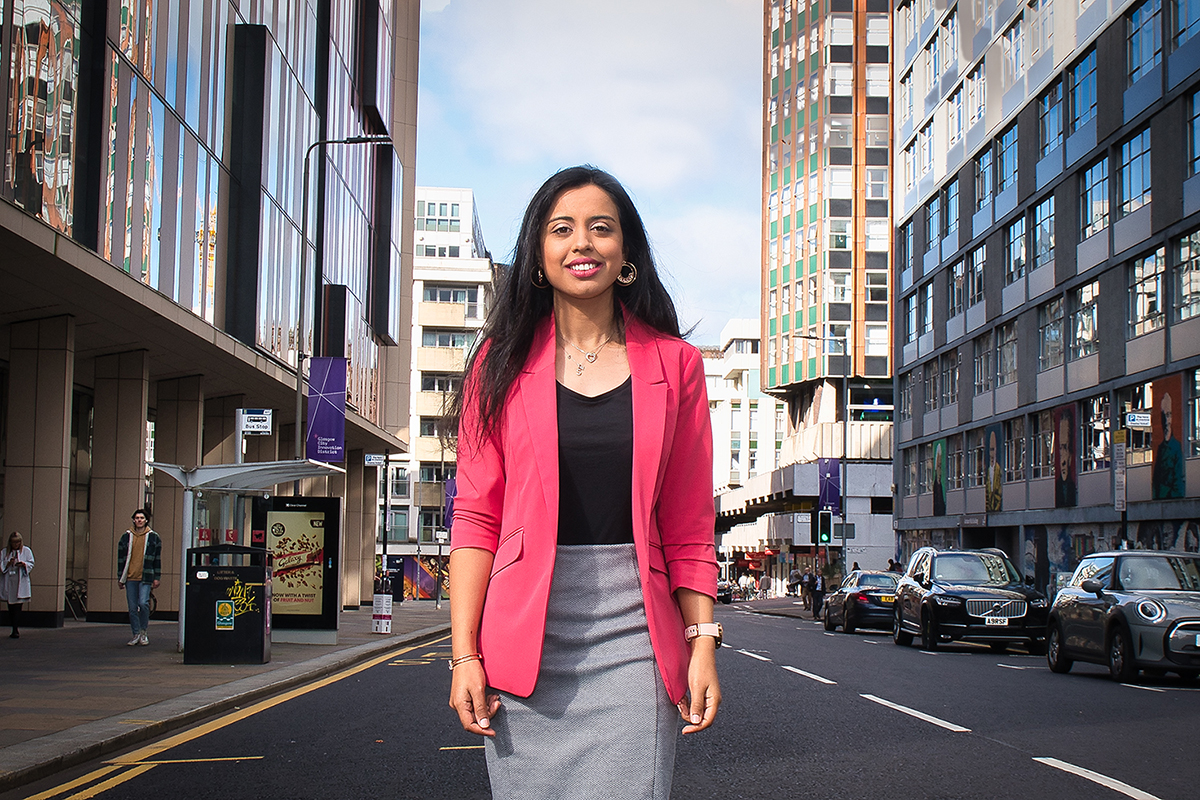
Sameeha
Muslim, Educator, Volunteer, Baker, Photographer
The idea for Sameeha’s award-winning social enterprise, Ubuntu, came to her at the age of twelve.
She witnessed many of her classmates being left behind by the education system, while others were provided with every opportunity to thrive. Driven by this inequality, she entered a proposal into a business competition at school. She imagined an enterprise which actively supports young people from disadvantaged backgrounds to learn life skills.
Years after reaching the final for the competition, Sameeha’s proposal came back to her when it was needed most.
When the first Covid-19 lockdown began, Sameeha was a recent graduate voluntarily tutoring children in kinship care. She organised videocall accounts for each child so they could continue with tutoring online. But many of them stopped receiving homework from school. When she inquired about the work, the schools were dismissive. The teachers said the children were not academic enough and were unlikely to do the work from home.
Sameeha was infuriated by this response. By a stroke of luck, she discovered her original business proposal while cleaning out a cupboard shortly after and resolved to make the idea a reality.
Now at the age of twenty-three, Sameeha runs an award-winning social enterprise alongside her day job as a Chief of Staff in the UK Parliament. She holds a Scottish Young Achiever of the Year award and was recently in the running for Scotswoman of The Year.
Her social enterprise, Ubuntu, supports hundreds of children and their families across Glasgow and Lanarkshire. Ubuntu offers free workshops in life skills such as budgeting, communicating, and working with people of different backgrounds. The enterprise recently won the Young Scot Enhancing Education Award 2022.
Uniquely, instead of inviting professionals from charities and businesses to run workshops, Sameeha encourages local community members to share their lived experience with the young people. Sameeha believes it takes a community to build a school and to educate a child. The name ‘Ubuntu’ is an African philosophy which literally translates as “I am because we are”.
Originally from Kenya, her family’s cultural background has inspired more than just the philosophy of her business. Sameeha’s faith as a Muslim has motivated her work and volunteering for many years.
Sameeha’s hope for the future is that schools in Scotland develop a holistic approach to education and that no young person is left behind because of their background.
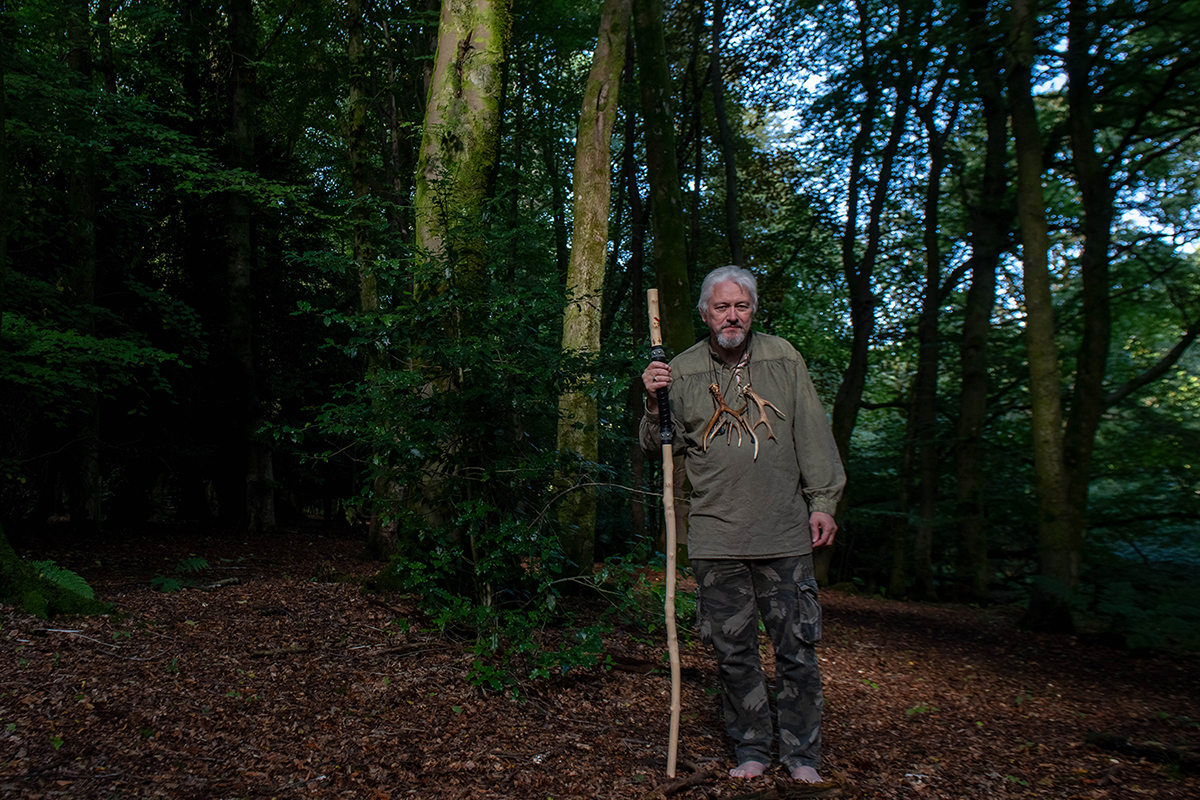
Neil
Druid, Pagan, Photographer, Engineer, Communicator
Neil’s path to Paganism began in a former mining town in the East Midlands in the mid-nineties.
His family worked in the pits for generations, and he felt a strong ancestral connection to the area. After the mining slag heaps were landscaped into parks and trails, he spent a lot of time exploring the developing nature.
Neil had a particular experience inside a grove of silver birch trees where he realised that language was not confined to humans, and that all of nature speaks if listened to closely.
Through the internet, Neil found others who had similar experiences and he read about their eureka moments when they discovered Paganism. His own beliefs developed gradually, and he later came to identify as an animist druid – someone who connects with the natural world and recognises spirits in both human and nonhuman communities.
Photography is a key way for Neil to practise his beliefs.
For over forty years Neil has worked as a domestic gas engineer and often finds himself driving in nature between jobs. Over the past decade, he has begun taking photographs along the way.
Sometimes he wakes up before sunrise and drives outside of Glasgow to the Scottish countryside. There he spends hours capturing striking landscapes and the nature thriving within it, including birds and fungi. His connection with nature is evident in his photographs which have won over 180 awards and been exhibited throughout Scotland.
Beyond his achievements in photography, Neil is proud to be the Vice Moderator of the Faith Communities Forum.
The forum represents the UK’s diverse faith communities and enables them to form a unified voice on social issues and legislation. Neil believes it is the first time any druid or pagan has held a role at a national level in interfaith work.
The Druid Network, which Neil has been part of since the nineties, successfully campaigned for Druidry to be recognised as a religion by the Charity Commission in England and Wales in 2010.
The legal definition of a religion was based on the belief in a single or sole entity God, so the Druid Network voiced their belief that nature is divine. The consequences were far reaching. Groups from native traditions in places such as Estonia and Lithuania were able to use the precedent to campaign for their own religious recognition.
Neil’s hope for the future is for the climate crisis to unify people of all beliefs and that together meaningful change will be possible to protect the Earth.
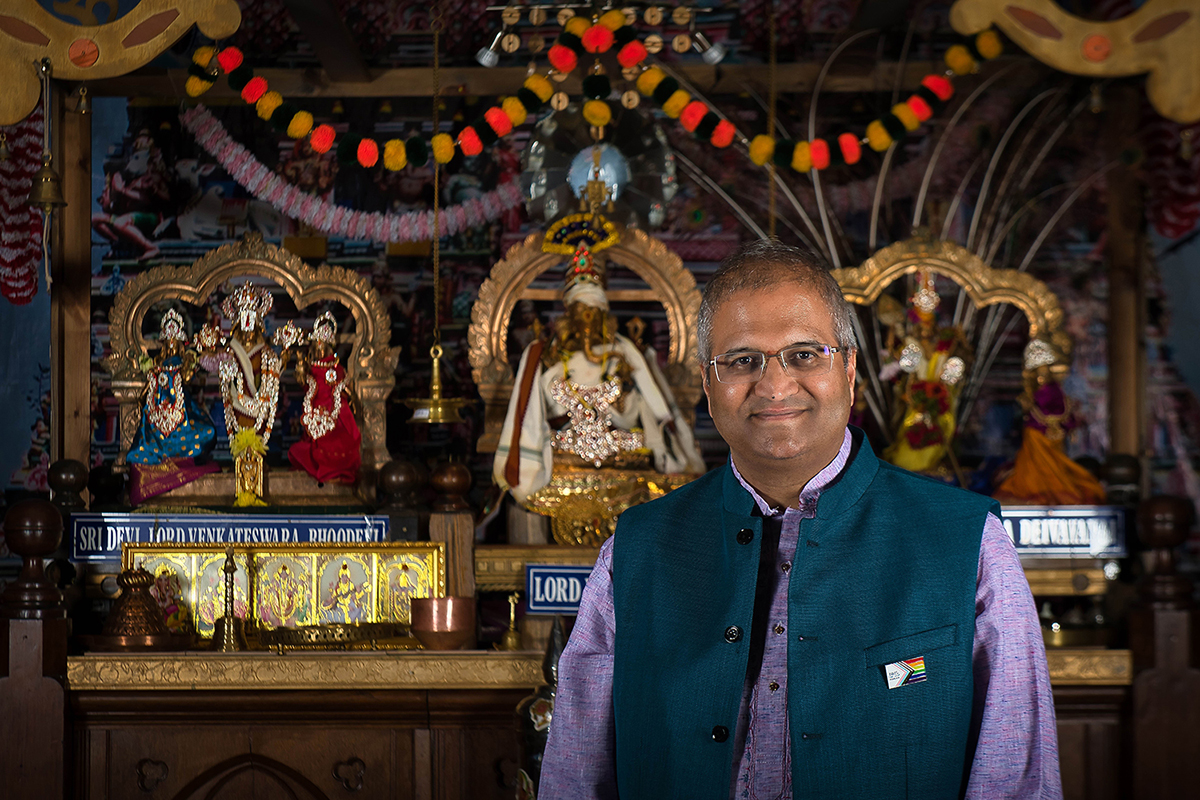
Srihari
Hindu, Surgeon, Husband, Priest, Cyclist
For nearly twenty years Srihari has worked as an NHS surgeon.
He arrived in Scotland as a trainee doctor in the early 2000s and now works as a consultant general surgeon specialising in endoscopy and bowel cancer at Borders General Hospital.
Srihari is also an ‘accidental’ Hindu priest.
Originally from a Hindu family in India, his parents encouraged him to study Sanskrit and learn the scriptures from a young age.
When he arrived in Scotland, he wanted to find a place for worship but there were not many Hindu temples at the time. Eventually he discovered the Hindu Temple of Scotland in 2011 where he joined in with singing and reciting hymns. His proficiency in Sanskrit was noticed and an attendee at the temple asked him to be their temple’s priest.
Since that day Srihari has offered his services to the Hindu Temple of Scotland and its devotees. In Hinduism there is no requirement to attend the temple to pray but people go there to offer communal prayers, stay in touch with their culture and traditions, and seek blessings from the deities and the priest.
Srihari’s favourite part of being a priest is helping people to offer prayers and wishes to deities, often about important worries or hopes in their lives.
Srihari has brought invaluable knowledge to the Hindu community in Scotland and has introduced new services, including rituals and practices, to communities across the country. One of the projects Srihari led through the Temple was recognised as the best community integration project in Scotland in 2012. The award was presented by Her Majesty The Queen Consort.
For years Srihari has travelled up and down the country offering his time to the spiritual wellbeing of Hindu families. However, due to demanding work pressures in the hospital, particularly in the first years of the Covid-19 pandemic, he has had to reduce his visits.
Along with his workload as a surgeon and commitments as a voluntary priest, Srihari is also a board member of Interfaith Scotland and an interfaith chaplain at the University of Glasgow. Through his role as chaplain, he gives talks on interfaith matters and inclusivity.
Srihari became an ‘accidental’ religious leader in 2021 when he was invited to speak at the COP26 Vigil in George Square, Glasgow. He was then invited to be part of the Scottish Religious Leaders’ Forum.
Srihari does not see himself as a religious leader, but he is passionate about raising awareness of Scotland’s religious and cultural diversity. He believes that we can gain a rich insight and understanding into the lives of others through interfaith dialogue.
Srihari’s hope for the future is that Scotland’s religious and cultural diversity will be recognised and celebrated.
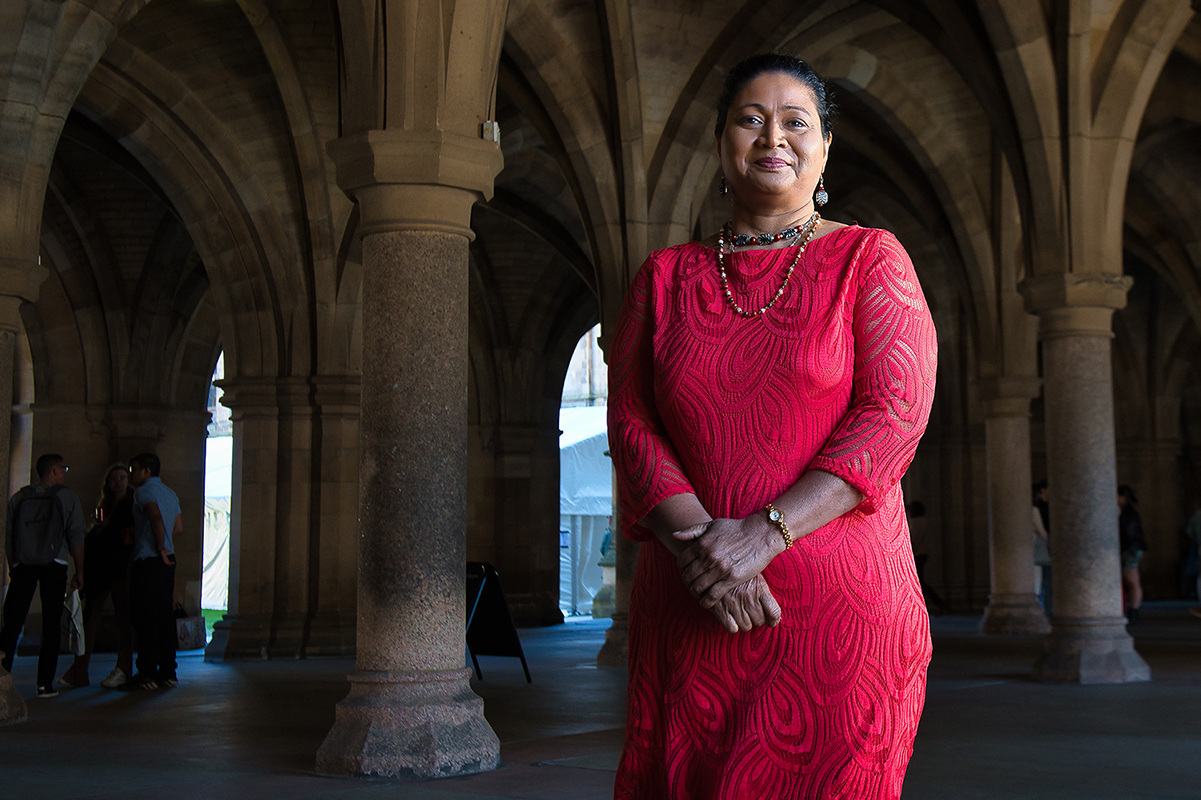
Mala
Catholic, Mother, Volunteer, Self-Motivator, Fast Learner
Mala arrived in the UK in 2017, bringing with her fifteen years’ experience as a politician, and over forty years in community development.
She faced discrimination when she arrived in Scotland but found strength in her faith and commitment to serving the community.
Mala was raised Hindu but was encouraged to respect all faiths. Her mother’s altar included statues from other religions including Buddha, Ganesh, and Jesus.
When Mala married in the early nineties, her mother-in-law requested that she convert to Catholicism when she felt ready. After moving to Glasgow with her grown-up son, she regularly attended both a temple and a church.
While passing St Mungo’s Church with her son one day she looked up at the statue of Mother Mary and was overcome with a feeling like a lightning strike. She immediately went inside and arranged her baptism with the priest.
Mala was baptised into the Roman Catholic Church on Easter Sunday in 2019.
Supporting the local community is a key part of Mala’s faith and values. In Malaysia she had been the founder and president of the Social Economic and Women’s Welfare Association which provided high quality support to women experiencing social exclusion.
Mala has been volunteering with various organisations in Scotland since she arrived. She is currently a trustee for the board of Interfaith Glasgow. She previously volunteered as a trustee for the board of the Central and West Integration Network which supports asylum seekers, refugees, migrants, and black and minority ethnic communities in Glasgow.
For her research for a food security project run by the network, she was awarded an Ethnic Minority Impact Award by CEMVO. Following in her footsteps, Mala’s son Shawn won Volunteer of the Year at the Scottish Charity Awards in 2021.
Mala is keen to build on her education and return to work. So far, she has studied an HNC and HND at Glasgow Kelvin College. Mala and her son have now both applied to study Community Development at the University of Glasgow.
While Mala has experienced discrimination in Scotland, she is determined to use her skills and expertise to make it a better and more welcoming place for all.
Mala’s hope for the future is to start an organisation to unite people of different faiths through cultural and traditional activities.

Anish
Hindu, Student, Activist, Singer, Optimist
Anish is a young Hindu from Aberdeen, fresh out of high school and starting university to study medicine.
Like many his age, Anish is an activist.
Tackling poverty and the climate crisis are the big issues Anish is keen to discuss, and he does so eloquently. Recently he approached his local MP and advocated for the UK to increase its vaccine equity efforts. The next day the MP raised the issue in parliament.
At only eighteen Anish is clear about his values and has been navigating challenging conversations for most of his life.
As a Hindu, Anish wears the sacred ash, known as Vibhuti, on his forehead, which he applies every day after praying. Having grown up with family and friends who wore Vibhuti, Anish was unprepared for the reactions of his classmates and teachers when he started wearing it to school in Primary 4.
In the classroom he faced unsolicited questions and even slurs. One boy asked him why he was wearing toothpaste on his head.
While seeking advice, Anish’s grandfather explained to him the importance of wearing the ash. Vibhuti provides energy to destroy negative thoughts and focus on positive ones, and it ensures that the wearer can connect with the divine. He said the Vibhuti symbolises that everyone comes from the earth and will return to the earth.
With this new understanding, Anish felt more prepared to navigate discussions about his faith with others. In recent years he has shared his experience as a young Hindu in Scotland at interfaith dialogue events across the country.
Through conversations with people of other beliefs Anish has noticed the similarities in religious views about the environment. In Hinduism, caring and protecting Bhoomi Devi (Mother Earth) is considered a religious duty that forms a part of a Dharmic lifestyle.
Anish believes that while religion is often perceived as a tool of the past, it can be used to shape a better future.
While Anish is headed for a world of medicine, he is taking his commitment to equality and the environment with him. He believes that while medicine has advanced greatly, we live on a polluted planet where inequality in healthcare is a reality for too many.
When asked about his future in activism, Anish does not shy away. He reflects on a recent conversation with an MP who told him it would never be too late to pursue a career in politics after medicine.
Alongside his studies, Anish is part of the ONE Campaign, a youth advocacy group focused on eradicating poverty. He is keen to engage in activism throughout university and beyond.
Anish’s hope for the future is that we move beyond tolerance and strive for a world where everyone can coexist freely.
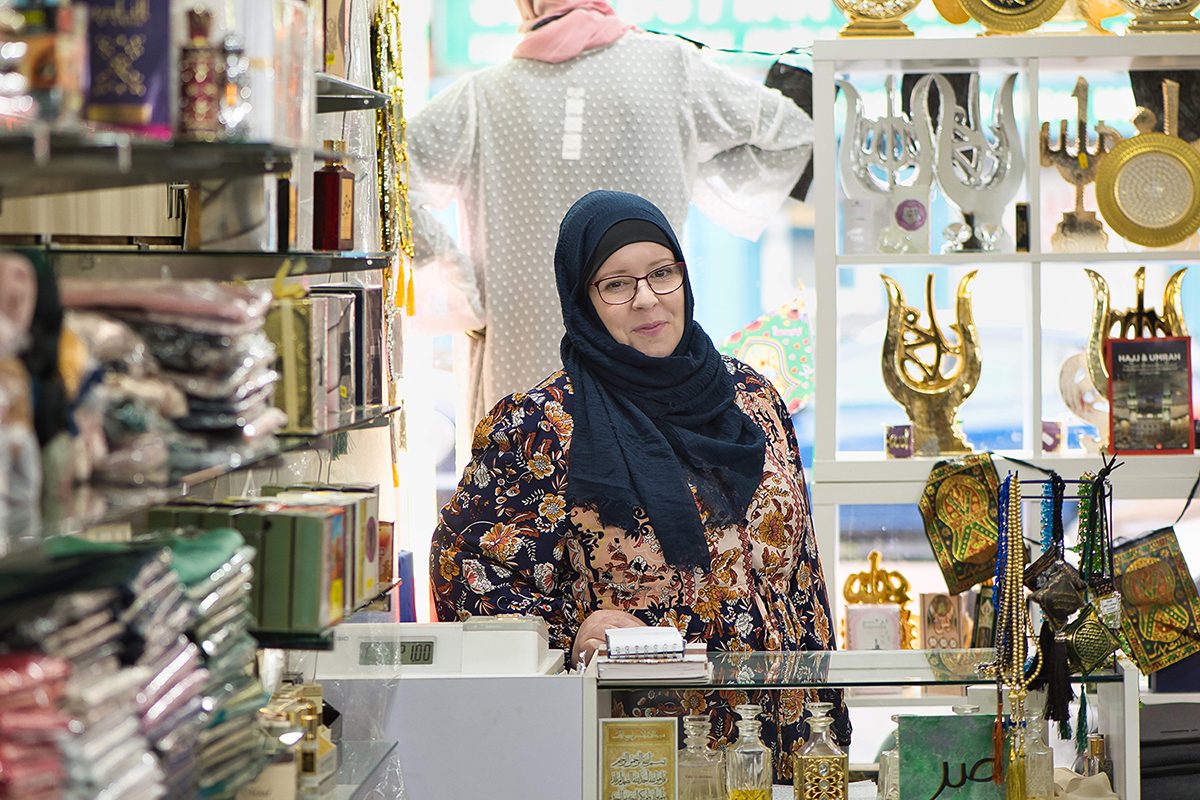
Linsay
Muslim, Activist, Wife, Daughter, Friend
Linsay was raised in Glasgow’s West End by an atheist father and a mother who believed in God but was not religious.
Her parents regularly took her to visit temples, churches, and mosques, and encouraged her to be accepting of everyone.
When Linsay later fell in love with Ayub, a Muslim man from Ivory Coast, her family embraced him.
Family members in both Scotland and Ivory Coast celebrated on the day the couple got married. Although Linsay never met Ayub’s father, who lived in Daloa, Ivory Coast, they developed a fond connection over the phone before he died. He did not mind that Linsay was not Muslim when the couple first met, giving them his blessing from the very beginning.
Linsay’s decision to revert to Islam came several years after she met Ayub.
She had long since fallen for Ayub’s strong faith and compassion for Allah’s creation. A cherished memory of Linsay’s is the day they found a dying bumblebee on the side of the road. Ayub reached down to pick it up and Linsay exclaimed that it would sting him. He continued regardless and placed the bee in a blooming flower. He reassured her, “Everything has a right to die in beauty”.
Linsay had struggled with mental health and other issues for years but was constantly moved by the peace Ayub channelled through his faith. A peace she found too when she recited the Shahada, a single sentence declaring her belief in the oneness of God and in Mohammed as God’s messenger.
But when Linsay began wearing the hijab in public, she was struck with racist and Islamophobic abuse.
The blatant prejudice further fuelled Linsay’s commitment to equality and the need for change. Instead of backing down, she raised her voice. Linsay is now the Chair of Interfaith Scotland and works for a charity empowering Muslims to engage in British media and politics.
Linsay is a strong advocate for Muslim inclusion but sometimes feels conflicted. As a white Muslim, she is often chosen to represent the whole community at meetings with politicians and public and third-sector officials. She has strong concerns that many ethnic minority communities are being left out of important conversations.
There are many changes Linsay would like to see in society, including more intersectional voices from faith communities being heard. She also wants the Scottish government to take a lead in tackling faith-based discrimination and hate.
Linsay’s hope for the future is for the voices of faith communities to be heard and respected at all levels of Scottish society.
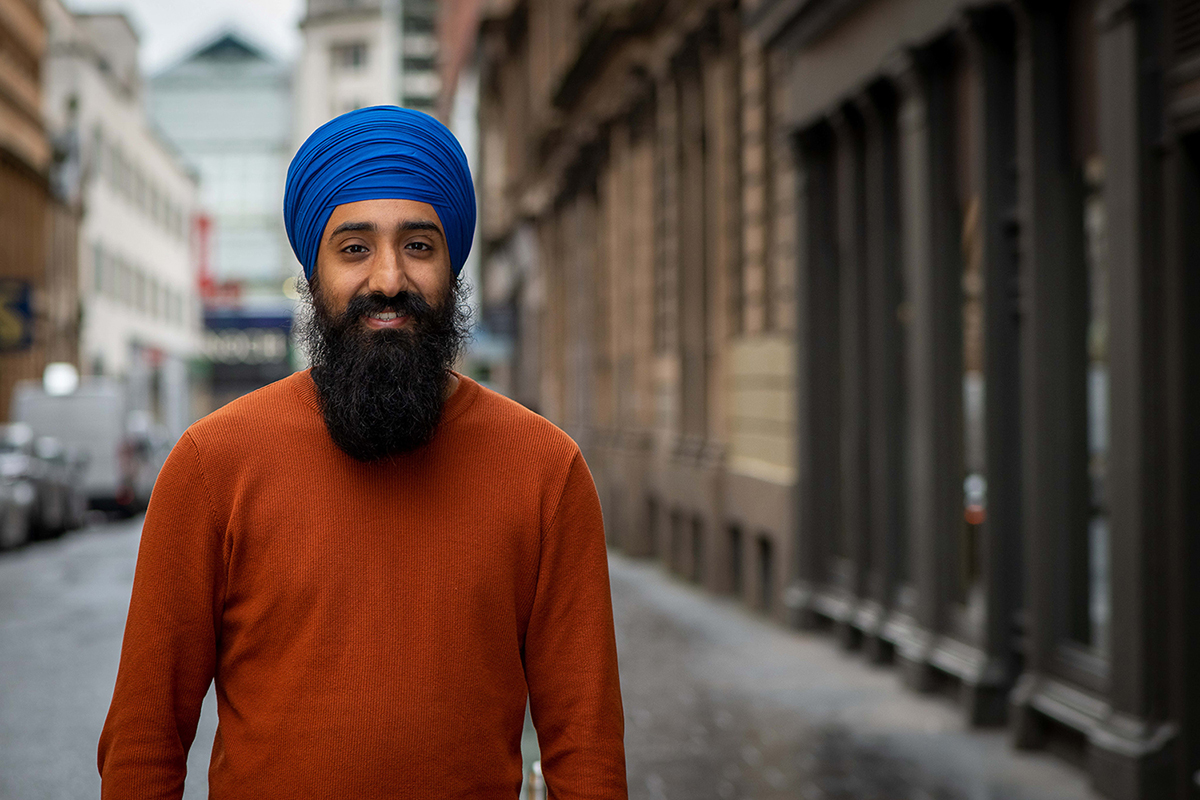
Sharandeep
Sikh, Anaesthesiologist, Volunteer, Optimist, Foodie
Growing up in the Sikh faith inspired Sharandeep to become a doctor, and it is also the reason he is passionate about volunteering.
For Sharandeep, using his skills and energy to help others is a crucial way to put the Sikh faith into action.
Sharandeep and his older brother, Charandeep, have been viewed as leaders and organisers in the Scottish Sikh community for years.
That is why, on a cold Saturday morning in March 2020, sitting in pyjamas in their Glasgow home, both of their phones began to chime and ring. Friends of the brothers were eager to know how they could help the community as the Covid-19 pandemic took hold.
As a doctor, Sharandeep had an insight into the pandemic’s impact and who might suffer the most. It was then the brothers decided to start The Sikh Food Bank.
The brothers gathered the Sikh volunteering network and partnered with the local Baptist church at Queen’s Park to operate the food bank.
People of all ages and backgrounds volunteered to help. Young professionals on furlough made the bulk of the volunteer base but they were also joined by pensioners, parents with their children, and even two Royal Air Force pilots on leave.
The initiative went on to deliver over 100,000 food parcels to people who were struggling to access food due to poverty and isolation.
Sharandeep and his team were determined to provide a holistic service which met the needs of the people they were helping. He believes that charity support should be conducted with dignity and compassion so that recipients are not left feeling dehumanised.
Those receiving food parcels were asked for their feedback on favourite foods and specific needs, and over time, they developed friendships with the volunteers.
More than two years on, the food bank has seen a dip in the number of people needing support, but unfortunately, the numbers are rising again. The cost-of-living crisis is putting pressure on people across Scotland who are facing difficulty paying for food or even finding suitable food on empty supermarket shelves.
Sharandeep believes that humanity has the capacity to eradicate poverty and inequality. He says that all humans have a divine spark within them – the potential to be changemakers – and that by using our skills and strengths we can achieve incredible feats together.
Sharandeep’s hope for the future is for humanity to respond collectively in times of crisis and compassionately support those in need.
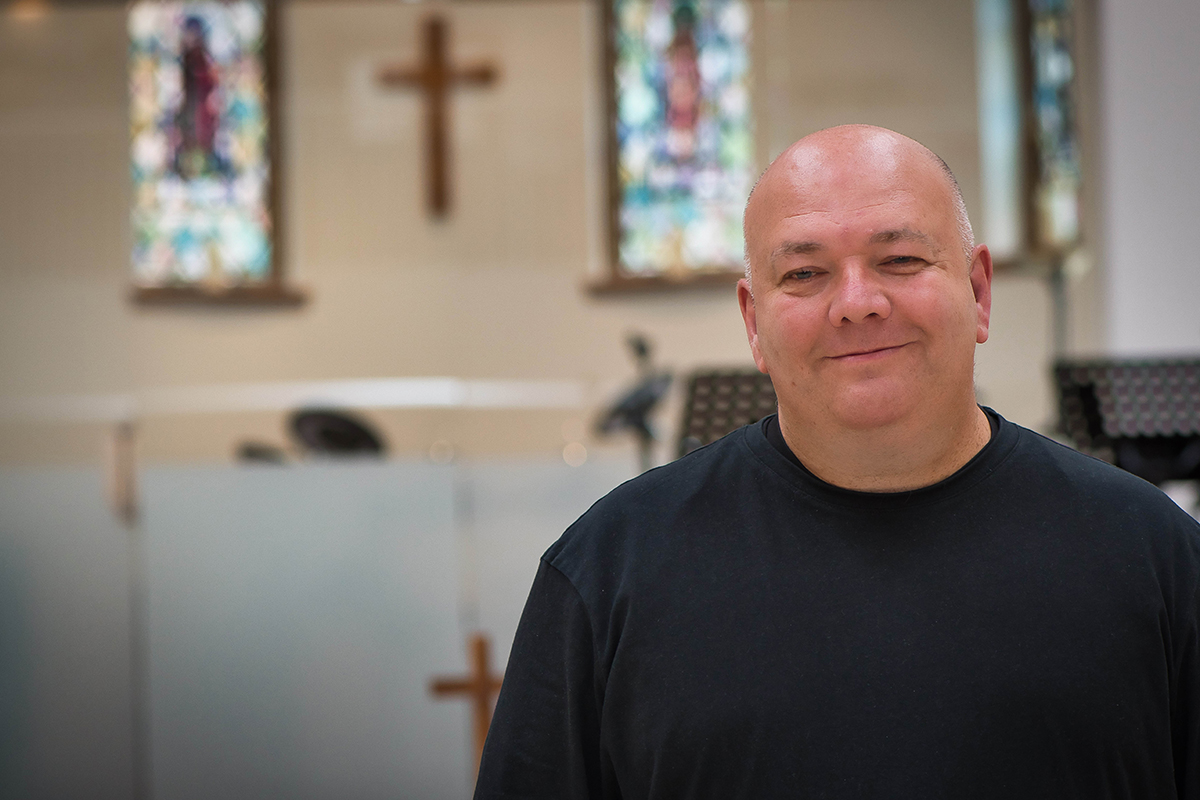
Bill
Christian, Father, LGBT Ally, Street Photographer, Book Reader
Bill has two gay children and is a member of an ‘affirming’ congregation in the Church of Scotland.
When Bill’s child Kirstie came out as non-binary, he was happy for them. When his son Stephen came out as gay, he was surprised. It was the first time he realised a person could have two LGBT+ children. He embraced them both with a parent’s love and became a strong advocate for inclusivity and equality.
Bill had been an active member of his local church in Glasgow since 2006, and a church Elder since 2011. He never had a crisis of faith, but after his children came out, he began having conversations about inclusivity with members of his congregation.
When he learned about ‘affirming’ churches, ones which actively accept LGBTQIA+ people, he wanted his church to apply for ‘affirmation’ status.
After many respectful conversations with the congregation, the decision was made for the church not to become an ‘affirming’ one. The minister at the time encouraged Bill to go where he felt most drawn. There was an inclusive church down the road, Langside Parish Church, and he soon became a member.
Neither of his children attend church but Bill prefers being part of a congregation which shares his values.
For years Bill marched with other churches in LGBTQIA+ pride parades. It was only after joining Langside that he finally marched with members of his own congregation.
After a historic vote at the Church of Scotland’s General Assembly in 2022, the Church announced that ministers could conduct same-sex ceremonies. The vote was won 274 to 136. The ruling laid out an opt-in scheme in which ministers who wished to perform these ceremonies could apply.
This was a landmark win for LGBTQIA+ Christians and their allies across Scotland.
Bill is happy to see change occurring within his own faith community, but he believes that there is a long way to go to achieve equality. He would like to see more ministers being vocal about inclusivity and applying for their congregations to become ‘affirming’ ones.
The story of Bill navigating his faith and being an ally to his LGBT+ children is a positive one. It highlights a changing tone in many of the stories coming from faith communities with regards to LGBTQIA+ inclusivity.
Bill’s hope for the future is for more churches to actively welcome and include people of all genders and sexualities.
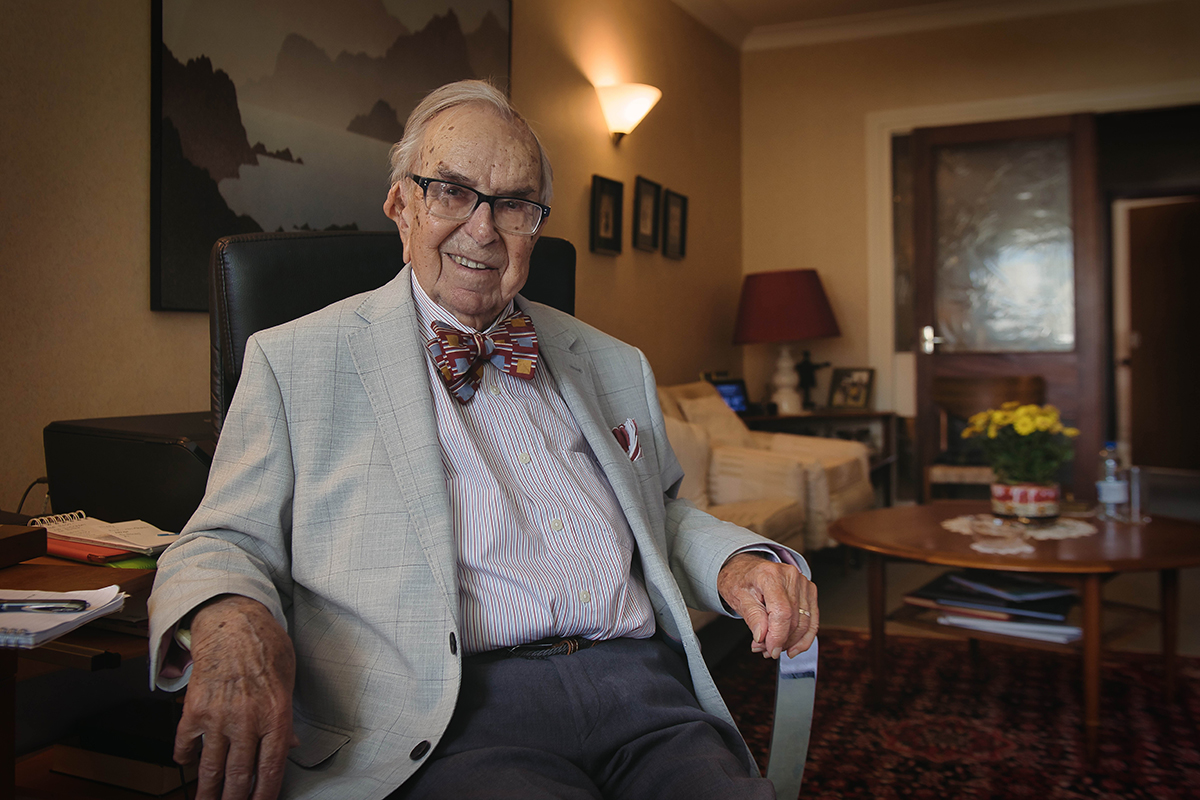
Henry
Jewish, Educator, Holocaust Refugee, Chef, Lover of Classical Music
Henry arrived in Glasgow as a refugee fleeing Nazi Germany in 1939. He was fifteen, alone and did not speak English.
Henry’s mother had secured him a place on the Kindertransport, a humanitarian aid programme transporting Jewish children from Germany to the UK before the outbreak of World War II.
Henry was warmly welcomed into the home of Mrs Hurwich, a member of the local Jewish community, and started school.
A year later Henry was charged with ‘corresponding with the enemy’ for trying to send a letter to his parents informing them of his wellbeing. He was suspected of being a spy and was traumatically interned on the Isle of Man, despite being too young.
After several tribunals, Henry was released. He returned to Glasgow and worked as a chef for high-end restaurants, following in the footsteps of his grandparents who had run a successful catering business. In 1941, Henry’s father died of a heart attack during an air raid in Germany. Two years after the war, Henry’s mother was able to join him in Scotland.
Henry met and fell in love with Ingrid who had also come to Glasgow by Kindertransport and lost many of her own family and friends in the Holocaust.
The couple soon married and had two daughters. They lived busy lives running a catering business and raising a family, but they both knew they needed to share their stories.
Together, Henry and Ingrid made it their lives work in retirement to educate others, particularly young people, about the Holocaust and where unchallenged prejudice and discrimination can lead. They educated hundreds of school pupils and spoke to thousands at events across the country.
Ingrid received an award for her services to Holocaust education and Henry was awarded an MBE for his work with limbless veterans.
Henry sadly lost Ingrid in 2020 after 75 years of marriage.
His Glasgow flat is adorned with photos of Ingrid, their daughters, and grandchildren. On a living room shelf stands a black and white photo of a teenage Henry in a bowtie with his parents, next to it sits a photo of grinning twin toddlers, two of his great-grandchildren. His third great-grandchild is one year old.
To this day, at the age of 98, Henry continues to provide his first-hand testimony of being a Holocaust refugee and raise awareness of the current refugee crises. He is keen to highlight how millions of children continue to be uprooted from their homes in wars and conflicts around the world today, most recently in Ukraine.
Henry’s hope for the future is for all young people to learn about the dangers of discrimination and to take responsibility for challenging intolerance and prejudice.
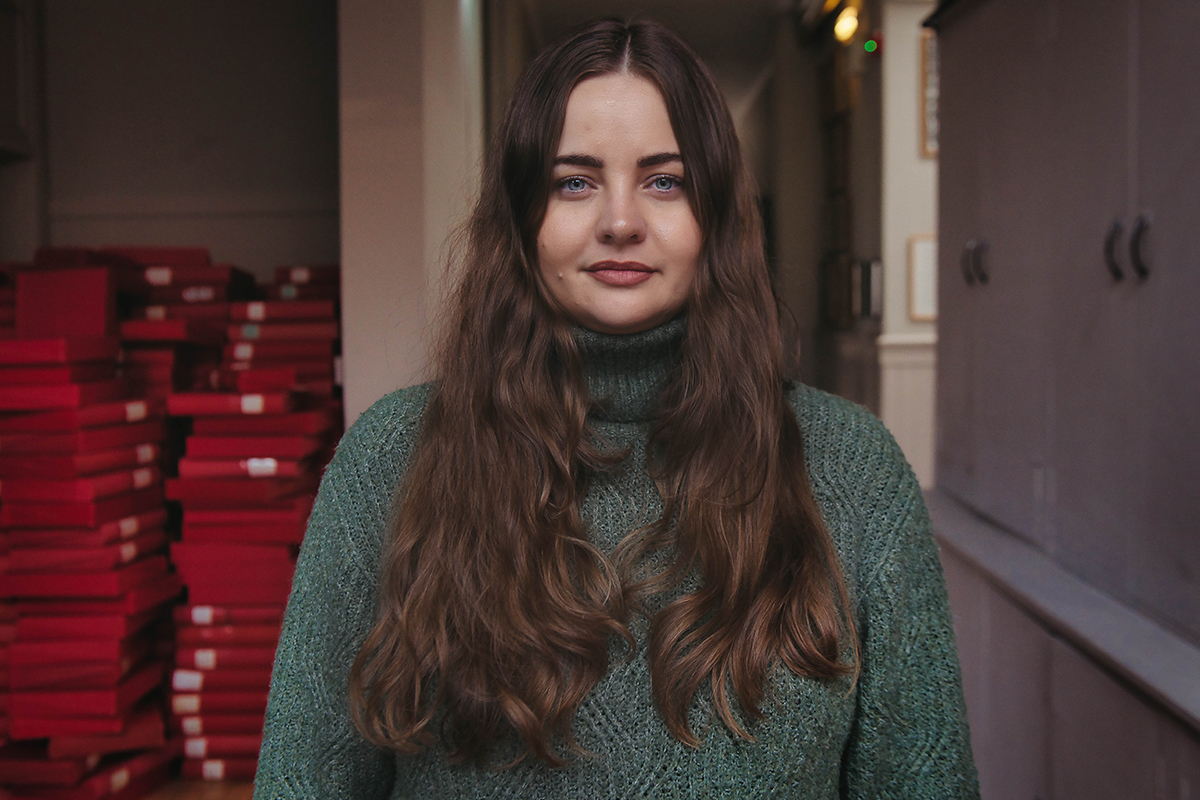
Hailey
Jewish, Activist, Public Health Practitioner, Foodie, Cat Lover
Hailey moved from California to Scotland over ten years ago to study religion. She now works to tackle Scotland’s drug death crisis.
She was raised in a secular interfaith family but became more observant in Judaism as she studied her own religion and others in depth.
The Jewish community in Scotland is small but over the years Hailey has keenly engaged in initiatives to build the community up.
Living a traditional Jewish life is very important to Hailey, including celebrating religious holidays, keeping kosher, and pursuing the Jewish concept of Tikkun Olam. The concept is defined by acts intended to repair the world and strive for social justice.
Coming from the United States of America where universal healthcare does not exist, Hailey has been passionate about the National Health Service since she moved to Scotland. She believes everyone deserves access to free, quality healthcare.
There is a Jewish ethical teaching that states, “it is not your duty to finish the work, but neither are you at liberty to neglect it”. In this vein, Hailey feels it is her duty to help others.
In 2014, Hailey pursued a master’s in public health with the goal of one day working for the NHS. After graduation she was hired for a dream role at a charity improving access to paediatric surgery around the world.
Hailey loved her job but when the Covid-19 pandemic hit, she felt a strong sense of duty to support the NHS effort. She sent off an application immediately and not long after she started a new role on NHS Lothian’s Health Protection Team.
As an epidemiologist, she supported outbreak investigation and provided insight into emerging trends – particularly in settings like prisons, schools, care homes and university halls. Hailey was proud to be part of Scotland’s response effort to the pandemic.
She later moved to an advanced healthcare scientist role at Public Health Scotland. There she helped produce the high level Covid data shown on the news every morning. The workload was high and intense, but Hailey was inspired by the skill and expertise of the NHS workforce.
Moving from one crisis to another, Hailey began working for one of the teams tackling Scotland’s drug death crisis a year ago. She had been following the situation since a major HIV outbreak was detected in Glasgow in 2015. Hailey feels she has found her best fit working to reduce drug harms.
Hailey believes that public health care acts as a value system and must be managed and developed well to ensure everyone receives equal support and care.
Hailey’s hope for the future is for Scotland to be a fairer and healthier place for everyone to live.
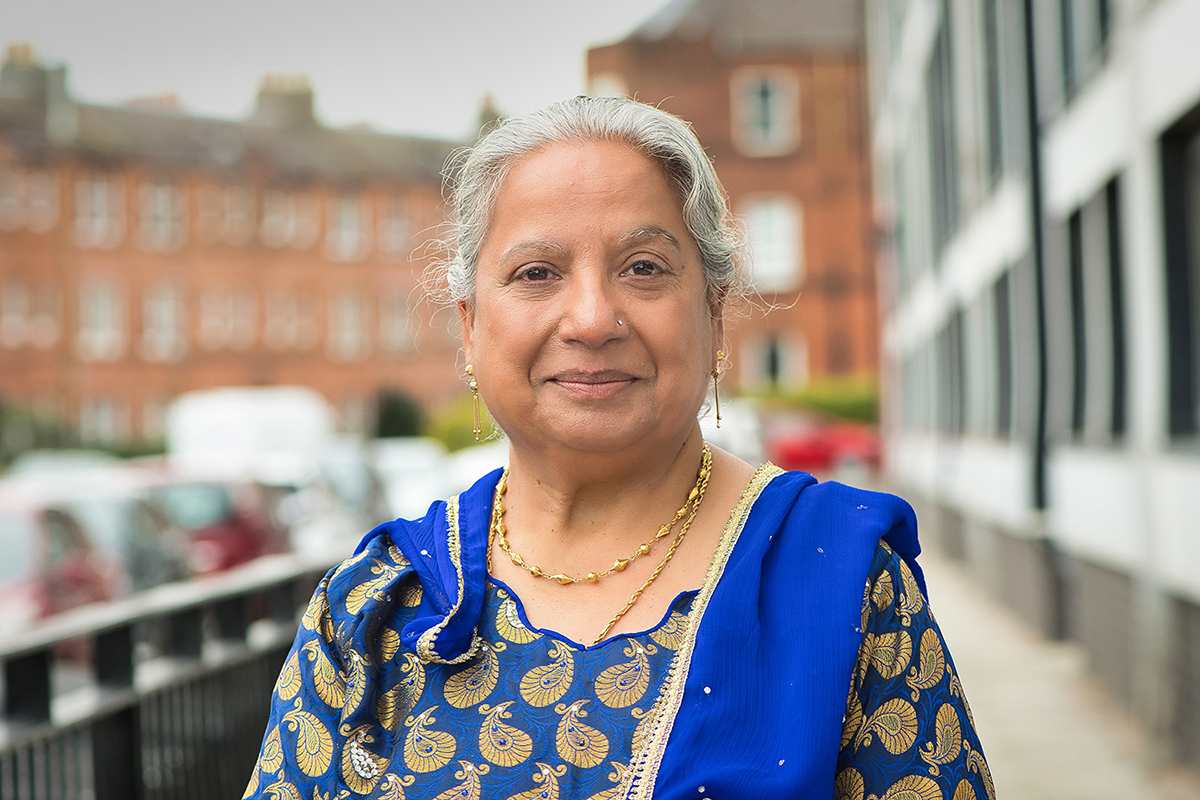
Trishna
Sikh, Glaswegian, Community Organiser, Author, Activist
Above a crisp factory in a Glasgow tenement in the 1950s, a few Sikh families, including Trishna’s, started the first Gurdwara in Scotland.
The atmosphere in the Sikh place of worship was relaxed. One of Trishna’s favourite memories is running downstairs and buying bags of broken crisps to share with other children on the Gurdwara floor.
As the Sikh community grew, they purchased a bigger building, and formalised the worship practices.
Trishna later married and had children. Sadly, she lost her son in a road accident in 1984. In the aftermath she searched for meaning in the scriptures. She found a sense of peace through the teachings, but she also discovered something she had never been told before.
The founder of the Sikh faith, Guru Nanak, had been a vocal advocate for gender equality in fifteenth century India. After learning this, Trishna realised that many of the gendered practices she disagreed with were cultural and not religious. This included Sikh women veiling their faces in the company of men older than their husbands.
Trishna began sharing her knowledge with other women in the community. In 1989 she took her efforts further by founding Sikh Sanjog. The Scottish charity aimed at supporting isolated Sikh women to make friends, gain qualifications, and secure employment.
Trishna is proud of the change she has witnessed in the community since the charity was setup. Now she sees her friends’ granddaughters and great-granddaughters living their own lives and having careers.
Many of the Sikh women Trishna grew up with could not read or write. While exploring ways to develop a social business with Sikh women at the forefront, the staff at Sikh Sanjog realised the key skills the women shared. Every day a group of four or five Sikh women could make a three-course meal for over 500 people in under five hours. This incredible feat is carried out as part of the Sikh practice known as Langar; a free community meal made in the Gurdwara’s kitchen.
Recognising these skills, Sikh Sanjog opened a social enterprise called Punjabi Junction in 2008. The business serves home cooked Punjabi food and empowers minority ethnic women to learn literacy, numeracy, communication, social and customer care skills.
Having left school with no qualifications, Trishna returned to education at the age of 51. She studied a degree in Community Learning and Development at Glasgow University. In recognition of her services to the community, Trishna became the first Sikh woman in Scotland to receive an OBE in 2014. Her memoir, A Silent Voice Speaks, was published in 2022 reflecting on her life as a Sikh woman in Glasgow.
Trishna’s hope for the future is for gender inequality within faith communities to be addressed and challenged.
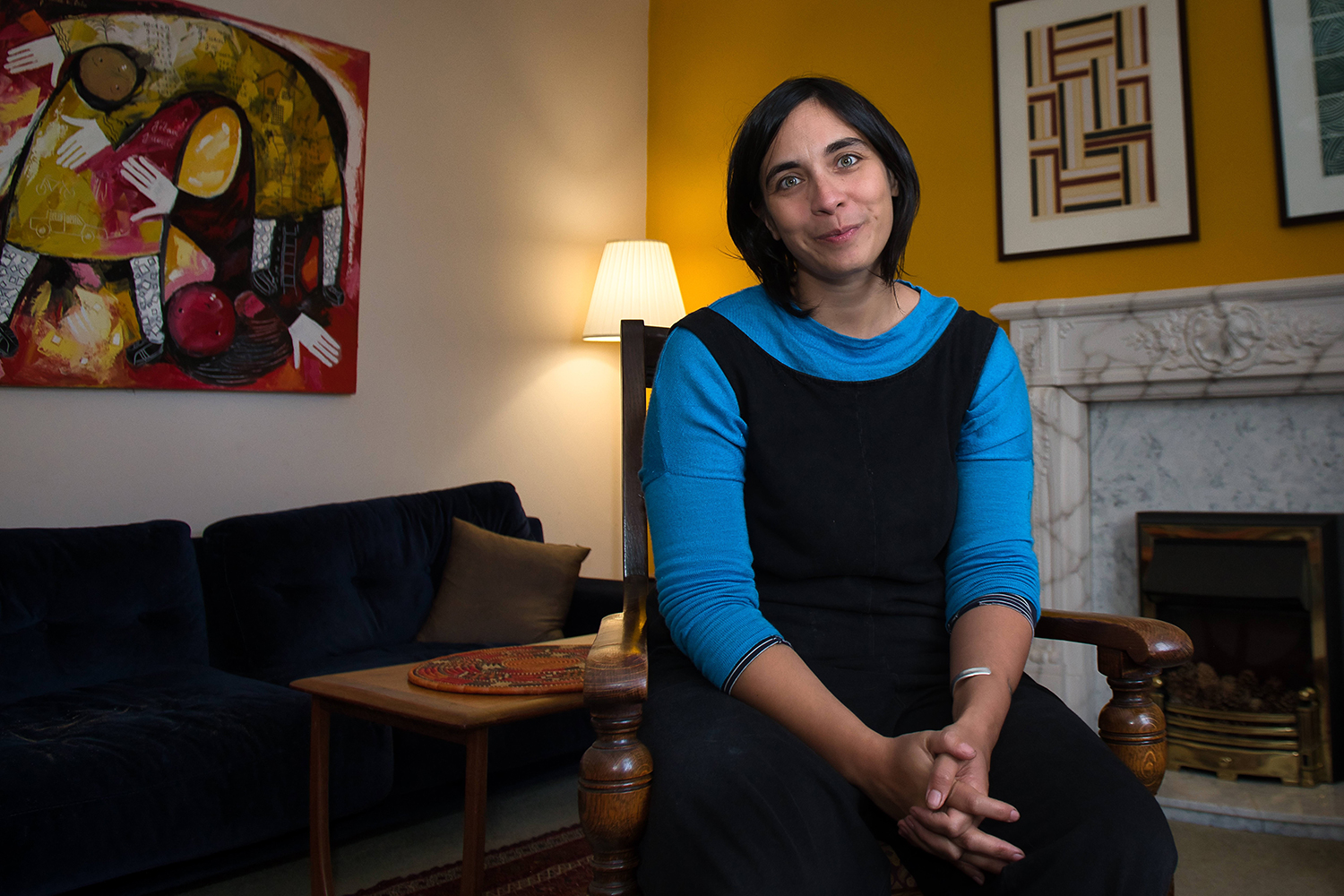
Isadora
Baha’i, Feminist, Mother, Humanitarian, Baker
Think of all the large-scale crises which have happened around the world in the last fifteen years; Isadora was probably there.
Through her role at CARE International, Isadora is involved in providing humanitarian aid to countries facing poverty, disaster, and conflict.
She has worked with communities in Afghanistan, Syria, South Sudan, and the Congo, to name a few. While she supports people living through some of the world’s worst atrocities, Isadora finds it empowering to be part of the front-line response.
Isadora is specifically tasked with working for gender equality within communities going through crises. During a particularly volatile stage of the Syrian civil war, Isadora worked on the border between Turkey and Syria. The situation was too dangerous for Isadora’s team to enter the country and she was forced to try to understand the challenges facing Syrian women from the outside.
Through this experience, Isadora created a tool called Rapid Gender Analysis which has since been used in more than seventy countries. The tool provides information about the different needs, capacities and coping strategies of women, men, boys, and girls in a crisis situation. It is used by humanitarians all around the world.
Most of Isadora’s stories from work are challenging to hear, but she warmly reflects on her time with a group of South Sudanese refugee women in Northern Uganda.
The women had been secluded to a designated area of a refugee camp, known as Village 6. The women in Village 6 created an empowering group for women of all Christian denominations in the camp to meet, talk and take action in things like adult education and on preventing domestic violence.
When Isadora visited the camp, she discovered that the women had constructed their own Catholic church and were delighted to share their ideas with her. Isadora’s team was able to create an empowering group for women of all Christian denominations in the camp to meet and talk.
Isadora’s passion for gender equality developed around the same time as her curiosity for religion. She grew up in a Scottish Chinese family in Methilhill in Fife, her parents were not religious but sent her to Sunday school every week. As a young adult, she spoke with people from many faith backgrounds. While living in the Democratic Republic of Congo she discovered the Baha’i faith and has been a member ever since.
The Baha’i teachings state that through gender equality the world will be a more peaceful and harmonious place. Isadora believes the world has a long way to go to achieve gender equality but that everyone has a responsibility to make it happen.
Isadora’s hope for the future is to see a world with more vibrant, equal, and peaceful communities.
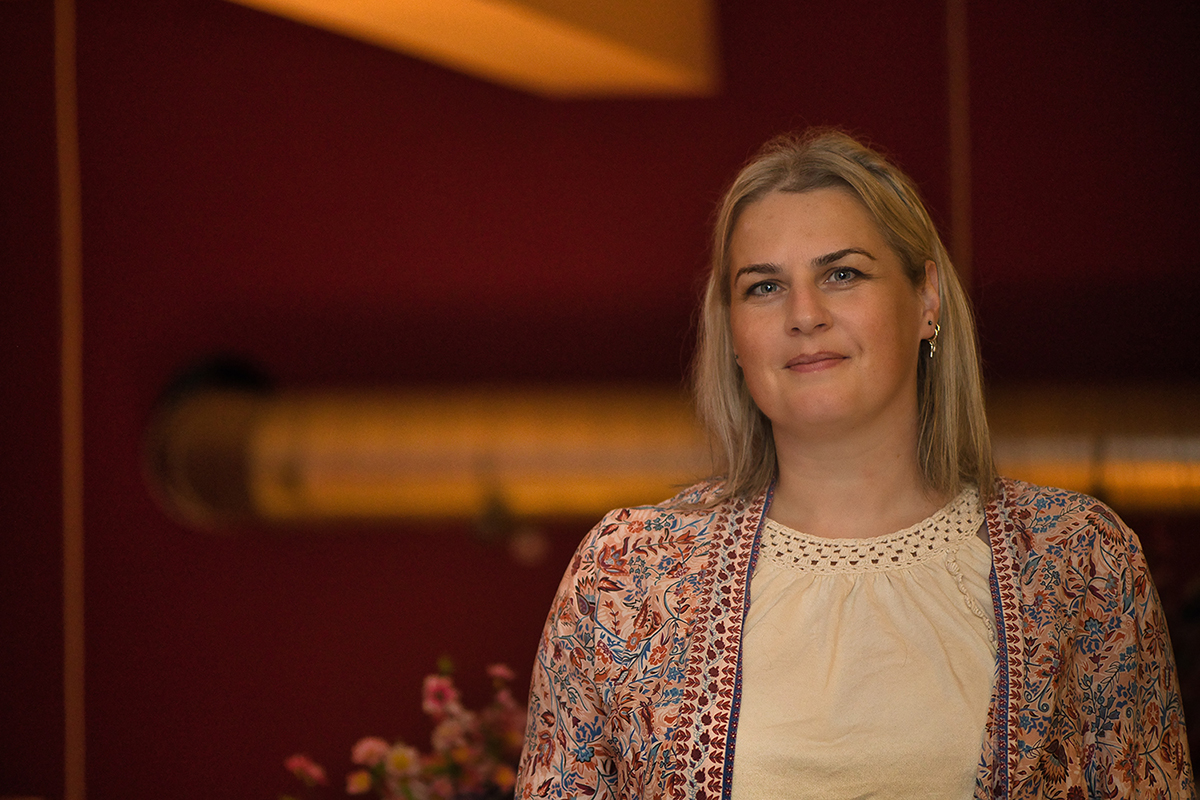
Nicola
Buddhist, Mother, Writer, Business Owner, Book Lover
Nicola is a Scottish mum of three and has been a Buddhist for over twenty-five years.
As a young adult she attended interfaith events and was curious about the Buddhist path. At the age of twenty-one Nicola visited Kagyu Samye Ling Monastery and Tibetan Centre. She felt drawn to learn more about Tibetan Buddhism after listening to a public talk by the Abbot, Lama Yeshe Losal Rinpoche.
Samye Ling is located along the River Esk in Scotland and became the first Tibetan Buddhist Centre established in the West when it was founded in 1967.
Over sixty people live in Samye Ling including monks, nuns, and volunteers. It is not a requirement to be a Buddhist to live there but residents are expected to live by certain values. The Centre offers retreats and training in Buddhist philosophy and meditation.
Nicola learns a lot from her teachers at Samye Ling and her family continues to be supportive of her chosen path.
As time has moved on, Nicola’s faith in the Buddha Dharma has endured over the years and her Buddhist practice is a very important part of her daily life.
At the beginning of the Covid-19 pandemic, Nicola participated in a six-month online retreat with her teacher Drupon Khen Rinpoche. The experience was hugely transformative, and Nicola felt even more inspired to tame her mind in order to develop kindness and compassion for all.
Nicola’s faith helps her to focus on the values she wishes her children to learn. Most vitally, she teaches them about the importance of being kind to others and being kind to themselves.
The Buddhist community in Scotland is small and sometimes people are surprised to learn about Nicola’s faith. Many of the Buddhist monks and nuns in Scotland wear bright orange or red robes, but for Nicola her faith is not as visible.
Through her role as board member of Interfaith Scotland, Nicola provides representation, and a voice, for the nation’s Buddhist community. Making the community visible is important to Nicola and she is happy to talk about her beliefs with others.
Nicola feels that she does not experience as much conflict or prejudice for practising her faith in Scotland as others may do, and she is keen to be part of the solution. She would like to see a more tolerant and open society where people stand up for the rights of others.
Nicola’s hope for the future is that people remain tolerant and open to others throughout the many crises faced by society.
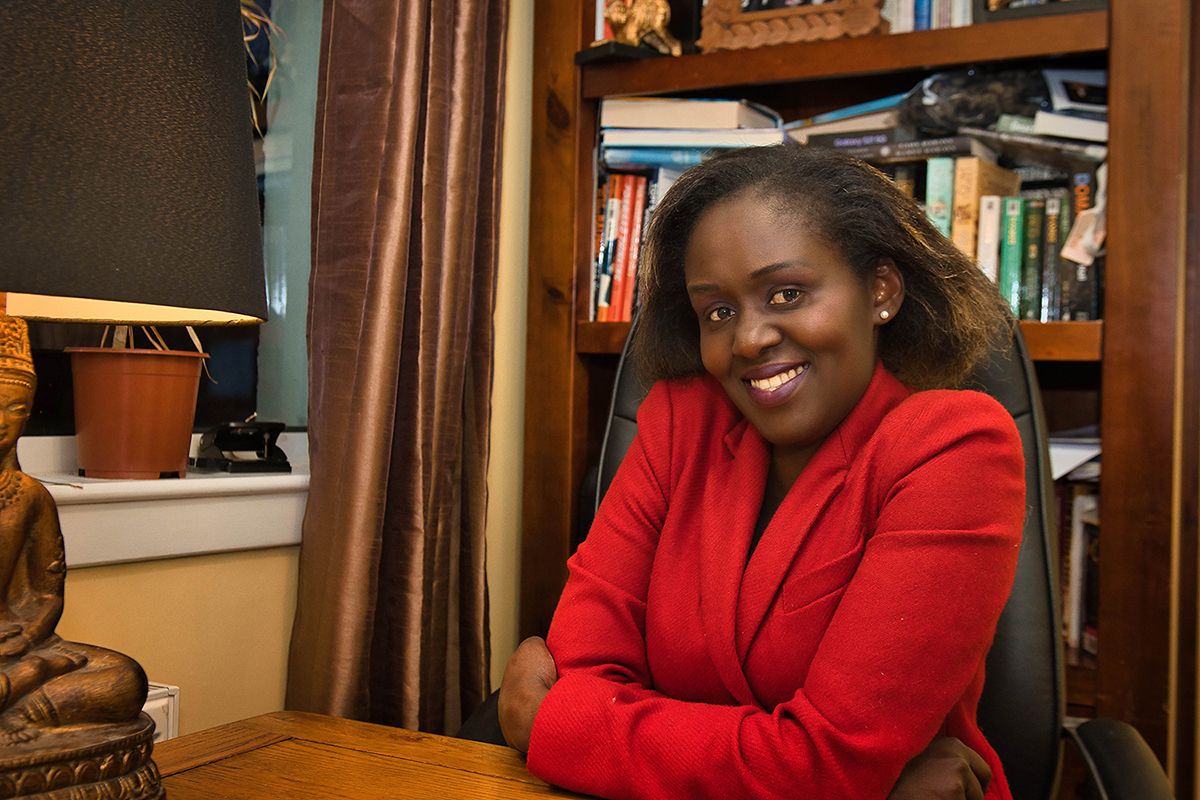
Umutesi
Christian, Mother, Gardener, Cook, Fashion Follower
Umutesi was born to a single mother in Rwanda in the 1980s during a time of increasing political unrest.
She lived with her mother and grandparents in a mountain village and was the second eldest of four children.
The country’s majority Hutu population and minority Tutsi population were in constant conflict with each other at the time. A conflict which had been heavily influenced by European colonisation.
When the ruling Hutu president died in a plane crash in 1994, tensions between the groups erupted into violence. Umutesi was twelve years old and witnessed unimaginable horrors in the days that followed.
More than one million people died in the 100 days of the Rwandan genocide, primarily Tutsis but also moderate Hutus. Around two million Rwandans fled the country during or immediately after the genocide.
With her mother and siblings, Umutesi fled towards the Democratic Republic of the Congo. Her eldest sister was lost in the initial days of the genocide and her mother was killed on the journey out of Rwanda.
Umutesi was left to care for her three younger siblings aged seven, four and six months. They walked for three months until they reached the Congo, sadly losing their brother to malnutrition along the way.
For five years Umutesi protected her sisters while they lived in the jungle in a state of constant fear and hunger. The Congo was experiencing its own conflict, and rebels roamed the jungle inflicting physical and sexual violence on those they encountered.
After years of suffering, Umutesi decided that if she was going to die, she would die in her own country. She returned to Rwanda with her sisters and discovered that forty of their relatives had died in the genocide.
Umutesi began piecing her life together and made friends with a German researcher who sponsored her to complete a nursing degree.
In 2012, Umutesi met Iain, a Scottish man working in Rwanda. They bonded over a love of music and later got married. She moved to Scotland in 2015 and they had two daughters together. Umutesi is happy in Scotland and feels ready to share her story. She hopes it will help others who have experienced similar trauma to know they are not alone.
Throughout her life, Umutesi’s Christian faith has supported her. She has always felt that someone was watching over her, giving her the strength to carry on.
Umutesi’s hope for the future is to see people happy and living in peace, and for humanity to learn from the mistakes of the past.
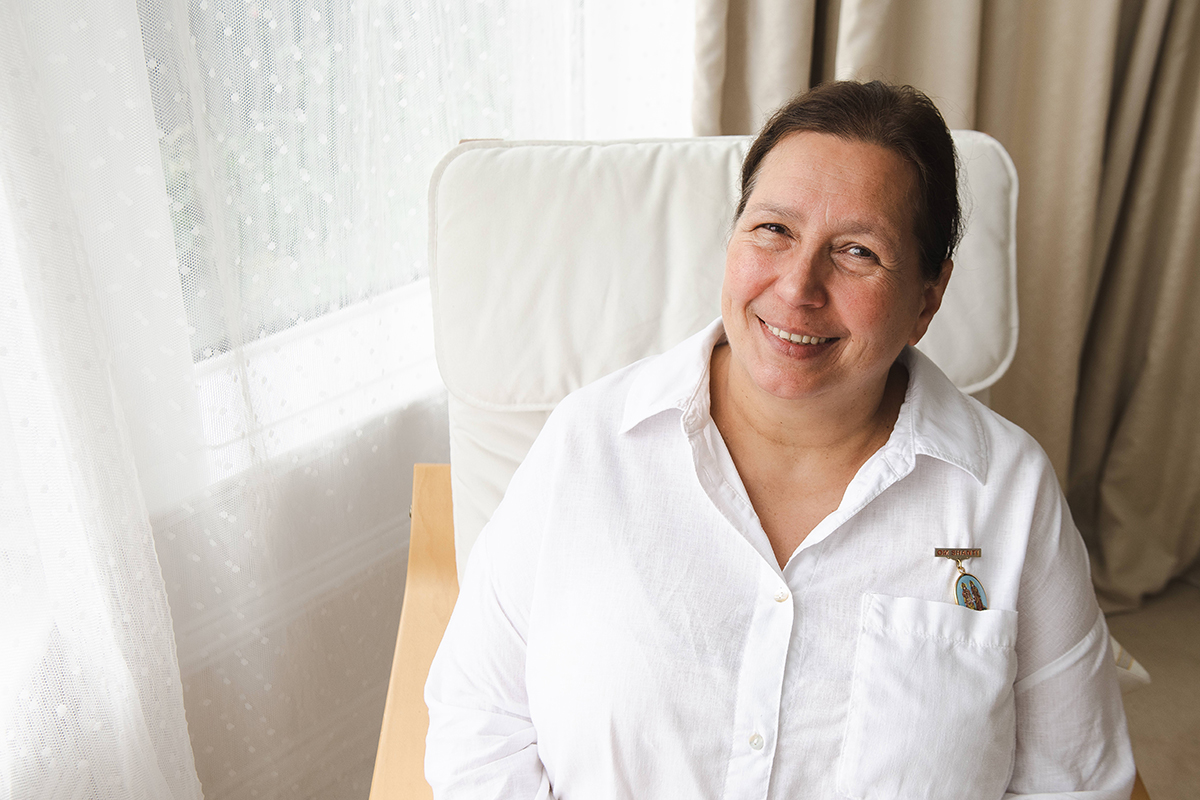
Astrid
Brahma Kumaris, Meditation Teacher, Occupational Physician, Traveller, Friend
Astrid has lived in the Brahma Kumaris Centre in Aberdeen for over twenty years, leading events and playing an active role in the interfaith community.
She also works in medicine and is the founder and director of a busy occupational health clinic in the city. Meditation plays a significant part of Astrid’s daily life and helps her to find balance.
From a young age Astrid felt drawn to spirituality. Her search began with Buddhism in which she enjoyed the opportunity to better herself through seeking higher spiritual awareness. She also had spiritual experiences, particularly in places of worship like churches where she would see auras.
For years Astrid attended hatha yoga classes. During one session, while holding a pose and breathing deeply, her mind wandered into a space she had not been before, a space that was peaceful, warm, accepting, and loving.
One day while working in a hospital and waiting for results, Astrid picked up a newspaper and saw an advertisement for a talk at the University of Aberdeen about Raja Yoga meditation. She did not know what ‘Raja’ meant but knew she liked the word ‘Yoga’. She was not particularly interested in ‘meditation’ which she had tried before and had little impact on her.
The talk was given by the Brahma Kumaris, a worldwide spiritual movement mainly led by women and founded in the 1930s. A key focus of the Brahma Kumaris faith is using Raja Yoga to reach a higher level of awareness.
For the Brahma Kumaris, the word ‘yoga’ means to forge the highest connection with the divine.
Astrid was inspired by the talk and began attending more Raja Yoga classes run by the Centre in Aberdeen. Over time she developed a greater understanding of herself and how to enter a spiritual space. She was later invited to live at the Centre full time.
A typical morning for Astrid starts with meditation at four o’clock followed by a study class at six o’clock where students of the Brahma Kumaris come together for meditation and reflection. She then heads to work.
Meditation helps Astrid to feel recharged and focused, supporting her throughout her busy day working as a physician and running the Centre. Through both roles she helps others to find balance and improve their physical and mental health.
Astrid’s hope for the future is for humanity to unite in peace, harmony, respect, and cooperation.
Faces of Faith
Over five million people live in Scotland and we each have a story to tell.
This exhibition is a showcase of Scotland’s diverse religious and cultural communities.
Freedom of religion and belief is a key part of Scottish society, but few are aware of just how many beliefs are practised here, or of the diversity within each community.
Through the stories of sixteen people, we explore the joys, challenges, and complexities of living as a person of faith in Scotland, and the impact these communities have on a local, national, and international level.
The common thread weaving through each story became clear to us with every interview. Our many religious communities may be diverse in culture and practice, but our values are intertwined – we all hope for, and are working towards, a better future for Scotland and the world.
We spent the summer getting to know each of these sixteen people and this exhibition is the culmination of many moments of connection.
In these photographs, we hope you will see not photos of strangers, but of the friends we came to know.
Thank you to the sixteen people who generously shared their stories and time with us.
This is an exhibition funded by Interfaith Scotland for Scottish Interfaith Week.

